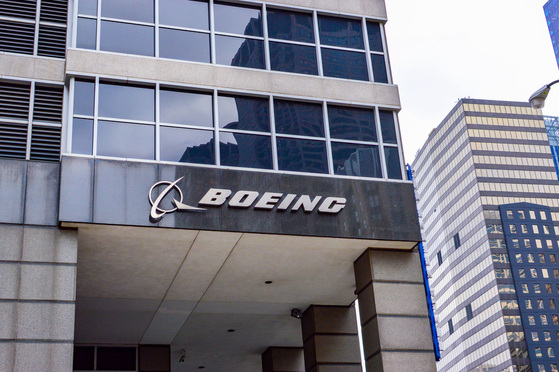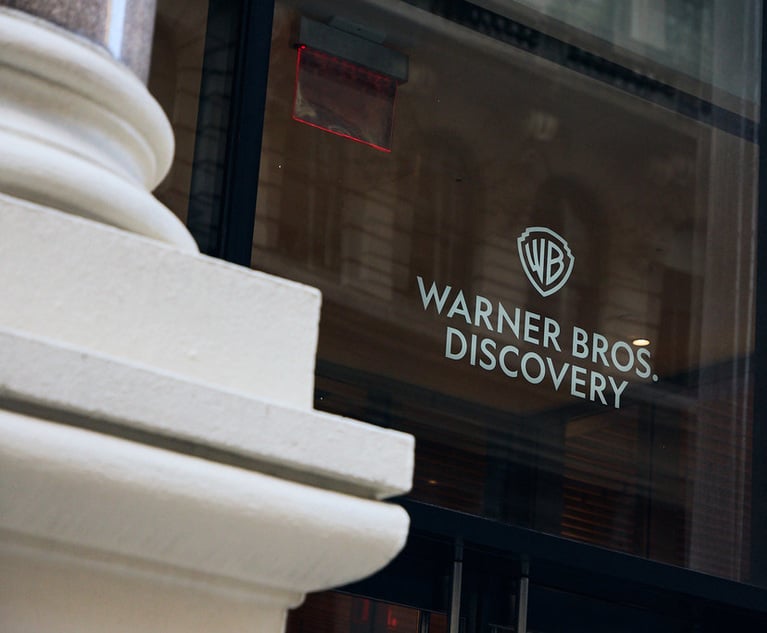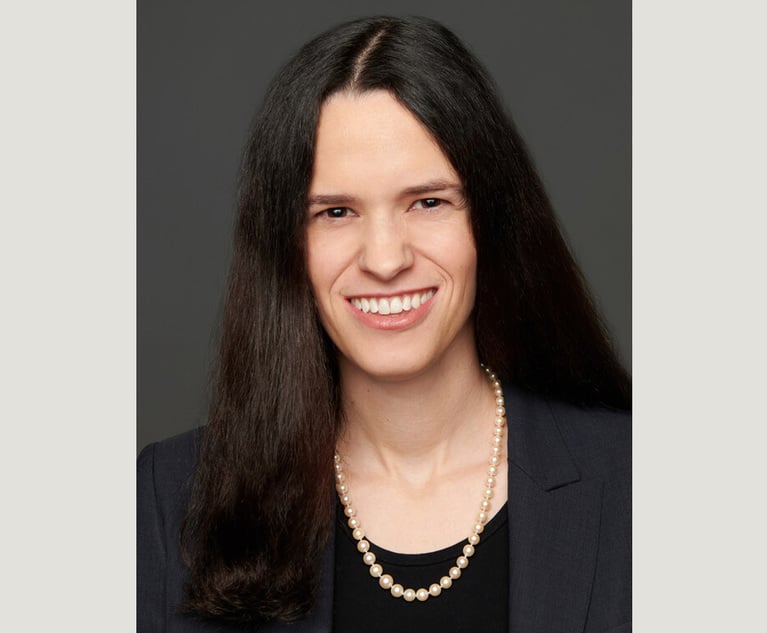Boeing Ousts CEO but General Counsel Installed in May Stays Put
The resignation of CEO Dennis Muilenburg marks the latest leadership shake-up at the troubled aircraft maker, which has reported $2 billion in losses from a crisis over its 737 Max jets.
December 23, 2019 at 03:16 PM
4 minute read
 Boeing headquarters in Chicago.
Boeing headquarters in Chicago.
The continuing crisis over Boeing's 737 Max jets, which have been grounded in the wake of two crashes that killed a total of 346 people, led to the ouster of the Chicago-based aerospace firm's CEO on Monday. But the company's new general counsel is staying put, at least for now.
The resignation of CEO Dennis Muilenburg marks the latest leadership shake-up at the troubled aircraft maker, which reassigned its longtime top lawyer earlier this year. The firm reported $2 billion in losses in the third quarter of 2019 connected to issues with the 737 Max, not counting legal costs and settlements. The Wall Street Journal reported that the company estimates the MAX crisis will cost it $10 billion, but said analysts expect that figure to at least double.
In May, Boeing announced that general counsel J. Michael Luttig was stepping aside after 13 years as firm's top lawyer to serve in a new role. Brett Gerry was elevated from his role as the Tokyo-based president of Boeing Japan to serve as Luttig's successor.
At the time, Muilenburg described Gerry as a "proven and talented leader, with the right mix of legal, business and government experience we need to help us succeed."
Gerry continues to serve as Boeing's top lawyer, a spokesman for the company confirmed Monday. Gerry was unavailable for an interview.
After leaving the GC post, Luttig took on a newly created role as counsel and senior adviser to the CEO and the Boeing board of directors. He also continued to oversee legal matters related to the Oct. 29, 2018, Lion Air Flight 610 and the March 10 Ethiopian Airlines 302 crashes involving 737 Max jets. Boeing did not immediately respond to a request for comment regarding whether Luttig would remain in his latest roles following Muilenburg's departure.
Muilenburg's resignation as CEO and board director is effective immediately, according to a statement from Boeing. Boeing chief financial officer Greg Smith will serve as interim CEO while the board's chair, David Calhoun, transitions into the role.
"I strongly believe in the future of Boeing and the 737 Max," Calhoun said in a statement. "I am honored to lead this great company and the 150,000 dedicated employees who are working hard to create the future of aviation."
Calhoun is slated to take over as CEO and president Jan. 13. He will remain on the board of directors, which "decided that a change in leadership was necessary to restore confidence in the company moving forward as it works to repair relationships with regulators, customers, and all other stakeholders," Boeing stated in a news release.
"Under the company's new leadership, Boeing will operate with a renewed commitment to full transparency, including effective and proactive communication with the FAA, other global regulators and its customers," the firm added.
Lawrence Kellner, who has stepped up to serve as non-executive chairman of the board after Muilenburg's departure, noted that Calhoun "has deep industry experience and a proven track record of strong leadership, and he recognizes the challenges we must confront.
"The board and I look forward to working with him and the rest of the Boeing team to ensure that today marks a new way forward for our company," he added.
The executive changes also came within hours after Boeing's first test flight Dec. 20 of an unmanned space capsule failed to reach the correct orbit, and was unable to dock with the international space station. The botched mission dealt a setback to a program intended to provide routine transportation for National Aeronautics and Space Administration crews to and from the space station.
Read more:
Boeing Names President of Boeing Japan as New General Counsel
Boeing Reports on $2B in Crash-Related Losses as Luttig Wrangles Undisclosed Legal Costs
Two Canadians Who Lost 10 Family Members In Ethiopian Crash Sue Boeing
This content has been archived. It is available through our partners, LexisNexis® and Bloomberg Law.
To view this content, please continue to their sites.
Not a Lexis Subscriber?
Subscribe Now
Not a Bloomberg Law Subscriber?
Subscribe Now
NOT FOR REPRINT
© 2025 ALM Global, LLC, All Rights Reserved. Request academic re-use from www.copyright.com. All other uses, submit a request to [email protected]. For more information visit Asset & Logo Licensing.
You Might Like
View All

JetBlue Airways Will Pay $2M to Settle DOT Charges of Chronically Delayed Flights

In-House Moves of the Month: Boeing Loses Another Lawyer, HubSpot Legal Chief Out After 2 Years
5 minute readTrending Stories
- 1Decision of the Day: Court Holds Accident with Post Driver Was 'Bizarre Occurrence,' Dismisses Action Brought Under Labor Law §240
- 2Judge Recommends Disbarment for Attorney Who Plotted to Hack Judge's Email, Phone
- 3Two Wilkinson Stekloff Associates Among Victims of DC Plane Crash
- 4Two More Victims Alleged in New Sean Combs Sex Trafficking Indictment
- 5Jackson Lewis Leaders Discuss Firm's Innovation Efforts, From Prompt-a-Thons to Gen AI Pilots
Who Got The Work
J. Brugh Lower of Gibbons has entered an appearance for industrial equipment supplier Devco Corporation in a pending trademark infringement lawsuit. The suit, accusing the defendant of selling knock-off Graco products, was filed Dec. 18 in New Jersey District Court by Rivkin Radler on behalf of Graco Inc. and Graco Minnesota. The case, assigned to U.S. District Judge Zahid N. Quraishi, is 3:24-cv-11294, Graco Inc. et al v. Devco Corporation.
Who Got The Work
Rebecca Maller-Stein and Kent A. Yalowitz of Arnold & Porter Kaye Scholer have entered their appearances for Hanaco Venture Capital and its executives, Lior Prosor and David Frankel, in a pending securities lawsuit. The action, filed on Dec. 24 in New York Southern District Court by Zell, Aron & Co. on behalf of Goldeneye Advisors, accuses the defendants of negligently and fraudulently managing the plaintiff's $1 million investment. The case, assigned to U.S. District Judge Vernon S. Broderick, is 1:24-cv-09918, Goldeneye Advisors, LLC v. Hanaco Venture Capital, Ltd. et al.
Who Got The Work
Attorneys from A&O Shearman has stepped in as defense counsel for Toronto-Dominion Bank and other defendants in a pending securities class action. The suit, filed Dec. 11 in New York Southern District Court by Bleichmar Fonti & Auld, accuses the defendants of concealing the bank's 'pervasive' deficiencies in regards to its compliance with the Bank Secrecy Act and the quality of its anti-money laundering controls. The case, assigned to U.S. District Judge Arun Subramanian, is 1:24-cv-09445, Gonzalez v. The Toronto-Dominion Bank et al.
Who Got The Work
Crown Castle International, a Pennsylvania company providing shared communications infrastructure, has turned to Luke D. Wolf of Gordon Rees Scully Mansukhani to fend off a pending breach-of-contract lawsuit. The court action, filed Nov. 25 in Michigan Eastern District Court by Hooper Hathaway PC on behalf of The Town Residences LLC, accuses Crown Castle of failing to transfer approximately $30,000 in utility payments from T-Mobile in breach of a roof-top lease and assignment agreement. The case, assigned to U.S. District Judge Susan K. Declercq, is 2:24-cv-13131, The Town Residences LLC v. T-Mobile US, Inc. et al.
Who Got The Work
Wilfred P. Coronato and Daniel M. Schwartz of McCarter & English have stepped in as defense counsel to Electrolux Home Products Inc. in a pending product liability lawsuit. The court action, filed Nov. 26 in New York Eastern District Court by Poulos Lopiccolo PC and Nagel Rice LLP on behalf of David Stern, alleges that the defendant's refrigerators’ drawers and shelving repeatedly break and fall apart within months after purchase. The case, assigned to U.S. District Judge Joan M. Azrack, is 2:24-cv-08204, Stern v. Electrolux Home Products, Inc.
Featured Firms
Law Offices of Gary Martin Hays & Associates, P.C.
(470) 294-1674
Law Offices of Mark E. Salomone
(857) 444-6468
Smith & Hassler
(713) 739-1250







